
LONDON — Whether it was news about Brexit or U.S. President Donald Trump, the U.K. aid community often woke up to a headache in their newsfeeds in 2017.
But peppered throughout those blows were several gut punches from British tabloids regarding “wasted,” “funneled,” or “snaffled” U.K. aid. For many, Sunday morning wouldn’t feel right without a Daily Express campaign to end the 13 billion pound aid budget, and any aid communication professional’s CV wouldn’t be complete without at least one robust public defense against claims from the Daily Mail.
Fortunately, the evidence is mounting that these media assaults on aid aren’t swaying the public, at least for now.
Before twisted headlines sink the aid industry, Devex rounds up some of 2017’s most migraine-inducing.
1. Most ENIGMATIC capitalization
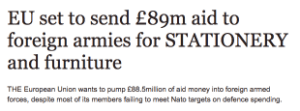
The headline writers of the Daily Express are connoisseurs of capitalization, thrilling and chilling in equal measure with a simple keystroke. But much like their approach to unpacking U.K. aid policy, the Express’ capitalization strategy is couched in mystery and intrigue.
This headline caught our eye for favoring “stationery” over “furniture,” yet nothing in the article explains their preconceived suspicion of pens and paper. (Runner up: here)
2. Most racist
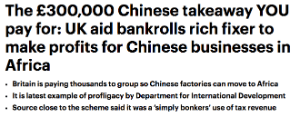
The Daily Mail has published an impressive number of aid-waste stories related to takeaways this year (obviously someone’s setting deadlines too close to the lunch break) but Devex felt this one took the biscuit, so to speak.
The story itself has nothing to do with takeaways; it’s just that one of its subjects happens to be Chinese. (Other takeaway headline: here)
3. Best use of the phrase “fat cats”
It might be an understatement to say that the for-profit development business model is yet to win favor with British tabloids. Stuck in an era when nuns, monks, St. Bernards, and other figures transcending income were best suited to deliver aid, many use the phrase “fat cats” to describe those working in development who make a profit or salary from their skills, even if the dollar amount shrivels in comparison to the non-development private sector.
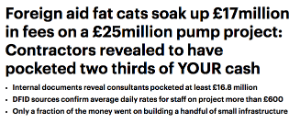
But the phrase “fat cats” is catchy, kind of cute, and best of all, it allows tabloids to snag readers who might’ve otherwise just been Googling images of obese cats to cheer themselves up. (Runner-up here)
4. Then how SHOULD we help the coconuts?
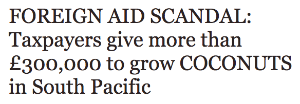
Why does everyone hate coconuts? Both the Daily Mail and the Express really took aim at aid funding for the delicious fruit. Look out for Devex’s upcoming campaign #SaveTheCoconuts. (Runner ups: here and here)
5. Most modest

Always take credit where credit is due.
6. Best alternate use of foreign aid (non-NHS)

When the tabloid media calls for the abolition of the aid budget, their usual suggestion is to divert the money to the National Health Service.
But after Hurricane Irma ravaged Caribbean islands this year, their idea was instead to divert foreign aid to help in the recovery of British overseas territories. Turns out, one of the prices one pays for owning climate change-vulnerable lands is covering the cost when things go wrong.
7. Best alternate use of foreign aid (NHS)

This old chestnut. No one is arguing that the NHS doesn’t deserve billions in additional funding, but after the Brexit campaign, one would think sweeping calls for diverting any budget to the NHS might merit more research.
8. Most self-defeating

The headline says it best.
(Runner-up: here)
9. Most baffling
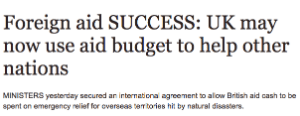
…
…
... ?
10. Best reveal
Related to the campaign against coconut aid, 2017 was a great year for creative reveals of outrageous aid spending. This one lambasts aid spending on anti-smoking campaigns and cooling mechanisms in China and India.

It seems the paper’s chief complaint, however, is that aid is spent in China and India at all, which are wealthy nations and not “the world’s poorest.”
As it turns out, of course, most of the world’s poor do actually live in India and China. (Runner-up: here)
For more U.K. news, views and analysis visit the Future of DFID series page, follow @devex on Twitter and tweet using the hashtag #FutureofDFID.
Search for articles
Most Read
- 1
- 2
- 3
- 4
- 5


